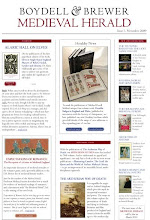Monday, 14 June 2010
The Christianity and Culture Project | The Debate About Teaching Religion/Religious Background
For our third Medieval Herald issue, Dr Rosalind Field (Chair), Dr Dee Dyas (Director) and Professor Helen Phillips (Board member) from the Culture and Christianity project asked us to post the article below. It raises an issue, important for teaching and studying humanities nowadays: that a solid grounding in religion is vital for a deeper appreciation of our literature, history and culture. If you would like to express your opinion and discuss this matter further, please comment on this article.
Christianity and Culture began in 1999 at the University of Glamorgan with the aim of opening up discussion on the need for providing help for humanities students and teachers with the religious content and context required to study literature, history and art. It has run a series of international conferences and publishes together with Boydell & Brewer the D.S. Brewer series of volumes, Christianity and Culture: Issues in Teaching and Research. Christianity and Culture works in collaboration with a number of institutions including museums, libraries, churches and cathedrals. The UK and international boards include academics from a range of disciplines, concerned with research and also contemporary approaches to teaching in universities and schools, as well as public understanding of heritage and culture. Christianity and Culture has been based at the University of York since 2002 and one of its most academically adventurous and successful activities has been the design and production of educational CD-ROMs, with input from historians, literary critics and art historians. Titles so far are Images of Salvation: The Story of the Bible through Medieval Art, Pilgrims and Pilgrimage and The English Parish Church through the Centuries: Daily Life and Spirituality, Art and Architecture, Literature and Music (2010). For fuller information on Christianity and Culture see the website www.york.ac.uk/projects/christianityandculture.
That is one example of an ongoing debate about the place of religion and religious background in modern education, and about ways in which teaching, books and teaching materials can assist not in evangelising but in educating students in the humanities. Ofsted, the government body responsible for standards in schools in the UK, published this week criticisms of the level of religious education in many British schools, especially with regard to Christianity. The discussion in newspapers and online which has followed has engendered debate which includes understandably the argument of the Secular Society that it would be better if schools desisted from teaching religion in any forms. There is, however, another, parallel, issue and that is the need for students – whatever their own personal interest or beliefs in religious matters – to have an adequate grasp of religious ideas and assumptions in order to appreciate and study many areas of the humanities. This is different from the teaching of religion as faith. Indeed, to understand the religious discourses and imperatives present in medieval literature, Shakespeare or the English Civil War, to take but a few examples, it is necessary to encompass attitudes that are alien from the faith of modern Christian believers in some respects, as well as principles that are still current. In an increasingly secular, multi-cultural modern society it seems important to widen the debate out from that about religion as religion (including the question of whether that should be taught in schools, and how) to the additional issue of what we might call religious literacy, in relation to literature, history and art.
To read our current Medieval Herald issue, sign up at our Medieval Herald Newsletter website.
Subscribe to:
Comments (Atom)

